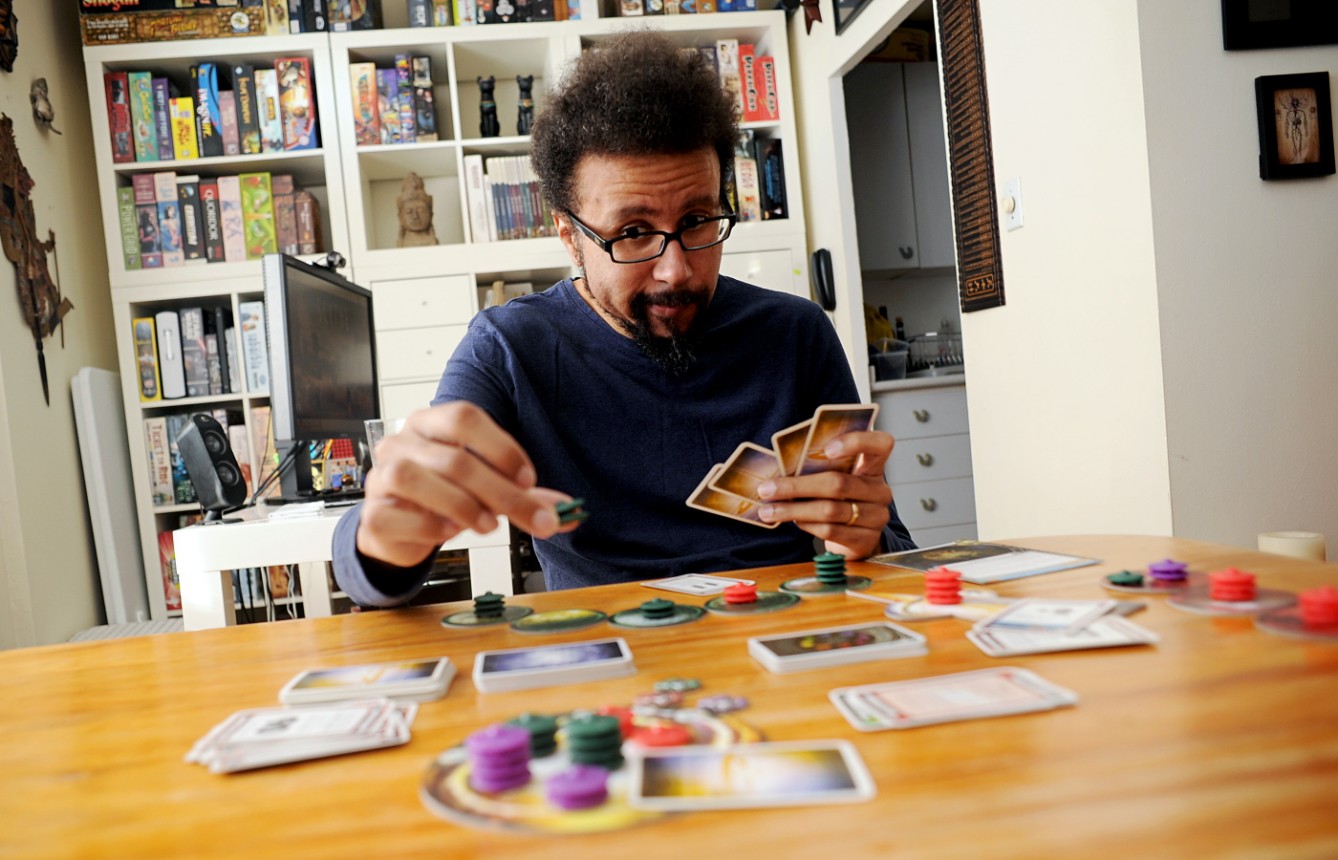„Board games are the best social lubricant.“ Eric Lang must know best, because inventing them is his job. An interview with one of the most prolific board game designers.
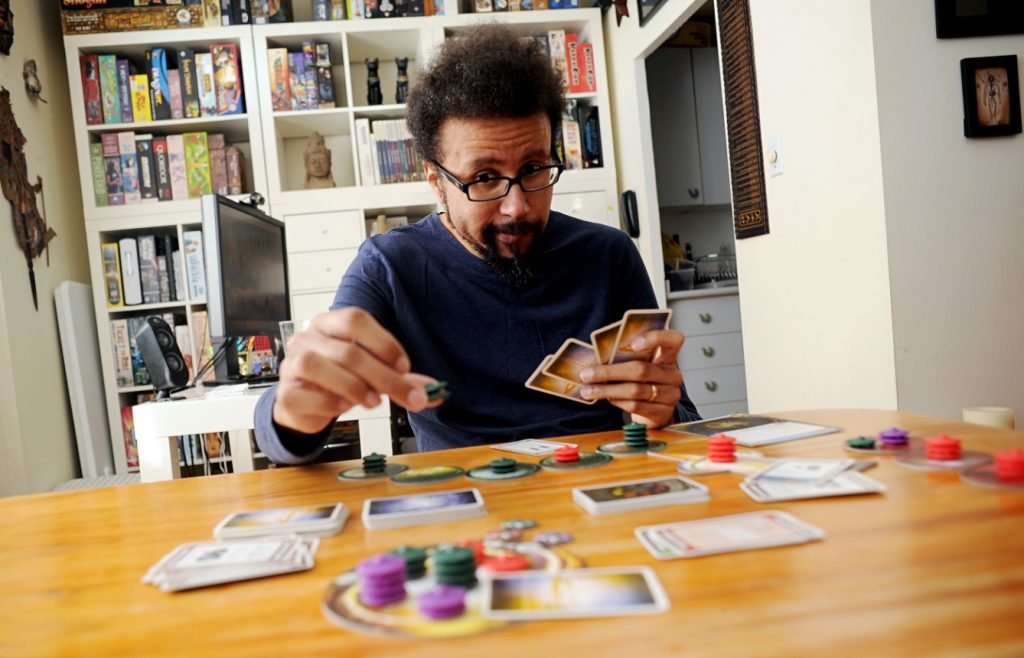
Interview by Varinia Bernau and Daniel Wüllner
This interview was conducted October 2016 at the SPIEL in Essen. At the world’s largest board game fair everybody is welcome to sit at a table and play some games – whether he is a hobby gamer or works in the industry. The volume level is accordingly. People roll dice, discuss rules, and laugh a lot. Here Eric Lang seems to feel like a fish in the water. Even tough the Canadian designer brings out four games each year, there is still some time to play a game. Nobody would mind: cause he is a gamer – just like them.
SZ: Let’s talk about money, Eric Lang.
Eric Lang: I love money!
And then you decided to be a board game designer? How much money did you make with your last game?
That’s hard to say. Usually, a designer earns five to eight percent of the publishers‘ net sales. If you’d bring a lot of experience to the table that might vary.
Every year at Essen you meet up with your friend and colleague Bruno Faidutti. After two glasses of red wine – you design a new game together.
That’s right. We meet at our hotel’s bar. But because Bruno is teaching full-time now, he wasn’t able to come this year. Our tradition already broken – after three years.
Did your three previous ideas pay off?
Our first idea was Dolores. In this small bluffing-game players divide up a pirate treasure. The second idea will be published under the title Secrets by Repos Productions in Belgium in 2017. The third one is still in progress, but might be abandoned.
And what did you earn – in comparison to the manageable cost of a few glasses of red wine?
Because Dolores was just released at Essen it is too early to say how it will sell. We are licensing our games to publisher. They try to secure global licenses for the games early on.
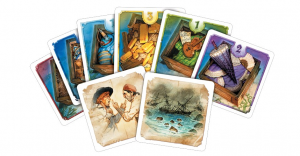
So you cede all your claims to make money of off your ideas?
No. Designers mostly own the intellectual property. So if there is an app-version, a toy contract or a movie based on my game, we have to negotiate individually.
Has one of your board games ever turned into a movie?
We are currently talking with Hollywood.
Sounds like you will be a made man soon.
I am not sure if the project will see the light of day. I’ll give it a 15% chance.
You were already in contact with the show-business, when you adapted the fantasy novel/ tv-shows TV-show Game of Thrones as a card game. Was that complicated?
Naturally, there were restrictions. But it was fun to try out my boundaries. I am a huge fan of Game of Thrones and I felt honored when George R. R. Martin, the author of the novels, called me.
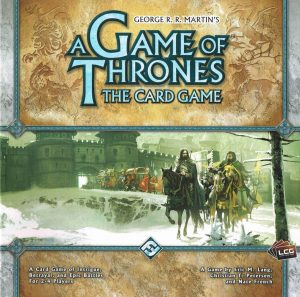
What did he say?
„Make it cool.“ That was his only request. He realized quite quickly that I am a fan. That’s why he trusted me.
What happens after two glasses of red wine? How does a board game come into being?
There are no fixed rituals. I have to be creative, so there is no sense in trying to fit the process into patterns.
Is there a design that functions in the whole world – a universal formula?
My basic principle is: fun is fun. That counts everywhere. My duty, as a designer, is to secure that every player is involved and that he understands cause and effect in the game. My games should be as simple as possible and at the same time they should have as much depth as possible.
So the social interaction is the red thread in all of your designs?
My philosophy is: games are all about the players. Some european board games celebrate the mechanisms. But mechanisms are just tools, and must not be the main selling point of a game.
What was it like – with Dolores?
The game is quite simple. Bruno and me came up with the first moves at the bar. The actual game that was printed was not that far remove from the basic idea. But it does not matter how quick the first idea was thought up. The game is not real until it is at the table with people playing it. Then you need to playtest – a lot.
What do you look for in these tests?

We are looking for flaws. Does it work? What about the gameplay? That is the technical side of things. But there is also the artistic side: Is the game special? Is it fun? We tend to watch people play: Does the game create a smile on their faces – or are they pulling our their smartphones the whole evening?
Nowadays people play on their smartphone all the time, instead of sitting down to an evening of board games?
The opposite is true: They tend to sit together around a table. In America and Canada board game cafés turn into social hubs.
What is the reason for that?
We are connected, all the time. Not with other people, but with our phones. There is a scarcity of human interaction. That is why board games are the best social lubricant. It is a reason to have conversations. People are coming back to the table.
„I got eleven games in my pipeline that will come out till the end of 2018“
Do people in Germany play differently than in Canada?I hope that it is not true. It depends on the market. Take my most recent game The Others for example: It is an atmospheric game where players are introduced to an apocalyptic setting. On the polish market the game did not sell well, because the hobby gamers in Poland are more into mathematical strategy games. Americans are commonly more lead by the theme of a game. The German market is the most diverse. There is a mass-market with games like Clue, Risk, and Monopoly. But there is also this other market, which serves hobby gamers.
What is different about that other market?
Their approach is completely different: If you offer them a unique experience in a game that might even tell a story, they will more likely buy your game.
Are you looking forward to winning the „Spiel des Jahres“ award?
That would be fantastic. But to me it is more a kind of mind set to create such a game. I talked to Tom Felber, chef of the jury, about the ideal Spiel des Jahres. It has to address differently types of player. A Spiel des Jahres needs a little bit more luck than skill. It has to be innovativ, but still be easy to play. Special, but not frightening. It is not my comfort zone, but I got one or two games in my pipeline that match the description.
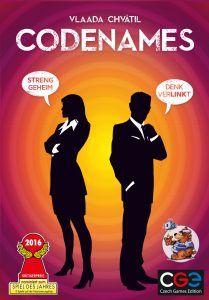
How many games are currently in your pipeline?
Eleven, that will come out till late 2018.
Did you plan our your entire life to become a board game designer?
Yes. I started out nearly twenty years ago. Since I finished school I knew that I wanted to design games. I did not study, and worked in shitty jobs, as a temporary and in fast-food joints. But that was not too bad, cause I always had a goal. I shared a flat in a cheap part of the city, not far away from the board game store. I went there every day, befriended the manager, and started working there. My first drafts were made there – I learned a lot.
What did you learn?
To separate my ego from my design. People that visit the store are not interested in making you feel good. They want to play a good game. I learned to take their criticism not too much to heart.
Sounds like a difficult process.
It took me years. I was young. And like all young people I thought my ideas were brillant. Until people say: This is shit! This experience was hard but important to me. It was necessary in order to be prepare to talk to publishers.
Frist, you tried you luck as a publisher yourself?
I designed my first game, but I had no clue what to do next. Then I got into contact with a publisher in San Francisco. We meet in an AOL-chatroom. You can see that was a long time ago. It was a small publisher, consisting of some people working from their homes. Back then I thought: Wow, a publisher! I never met the money-guy who was supposed to pay the bills. Shortly before we were about to publish the game, I realized what a house of cards their cooperation was. They said, we are sorry, but we will not be able to do it. I was so angry that I build my own company. I hired some of my friends. A bad idea.
Why is that?
These guys were the people I played games with. We did not know the industry. I wasn’t a good boss. My victory condition is to make good games. All my decisions circled around the question, how cool my game will be. But I didn’t put a single thought into the question, if it will make money at all.
But at first it did not look so bad.
That’s right. My first game Mystick was customizable card game with tarot-cards. We got us some suits and a booth at the Gama Trade show in Las Vegas. We did score many orders – unfortunately.
Aren’t many orders a good thing?
We overestimated the demand. The print run of the first expansion was as high as the base game. We did sell about ten percent of that. We had to put the rest into our storage – unsold.
And then?
That was the first time I flew to the SPIEL in Essen must have been 1997. I was looking for new costumers. Instead I met people who offered me jobs in the US. But the visa-requirements were too high. As a consequence I started my own studio in Canada. It was an act of necessity. I still design my games there. I can focus completely on the games and offer them to publishers. It is the ideal solution for me.
„Stratego changed my life“
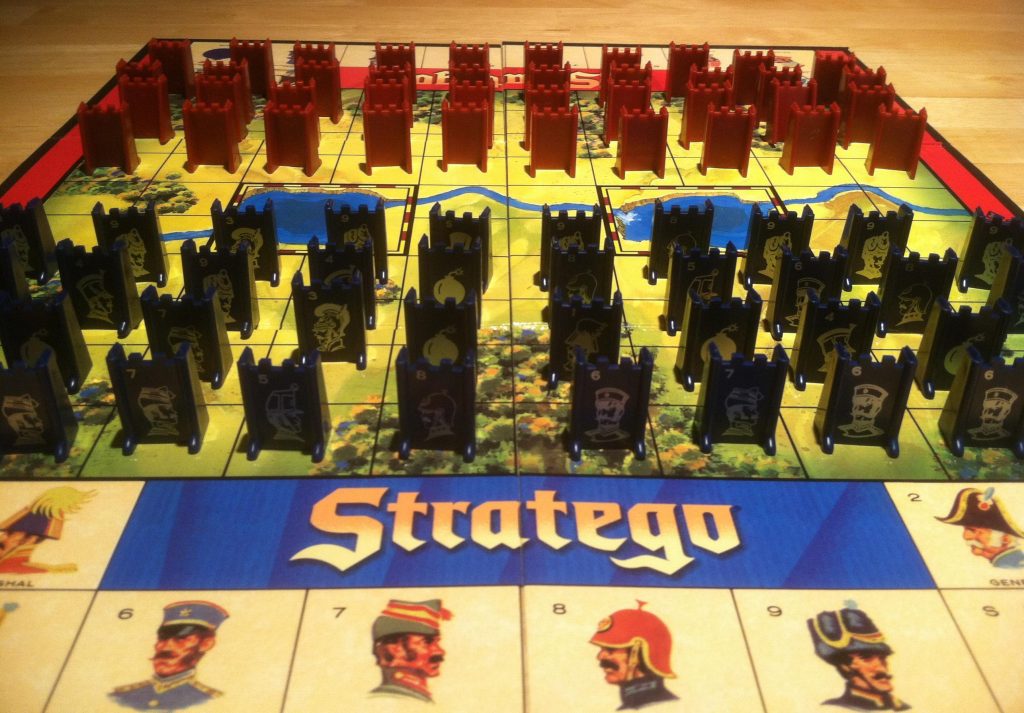
When did you first realize your interest in designing games?
I design games since I was seven. Most of my summer holidays I spent in Germany, because my grandmother lived in Neuss. Together we played a lot: Mensch ärgere dich nicht, Phase 10 or some other terrible game I can’t even remember. Still, I really enjoyed the time. When Mensch ärgere dich nicht bored me I came up with a different set of rules.
What did you change?
There was only one round. Robots and dinosaurs made an appearance on the playing board. I was always thinking like a board game designer. Then I played Stratego for the first time. It is a board game for two player, similar to chess, where the the opponent learns the value of a playing piece only by attacking it. That game changed my life.
Why was that such an extraordinary experience?
Prior to that board games were just a pastime, when there was nothing else to do. Or if it rained outside. Stratego was a game I wanted to play. Only later I realized that I played it not according to the actual rules. I did not read them that carefully. But I liked my rules even better.
Eric Lang’s most recent Kickstarter Rising Sun
I can imagine your parents were not happy, when you told them you want to make board games for a living. What did they say?
My parents are very German, very conservative. Both of them worked for Lufthansa. They wanted me to have a good government job with a good pension. Board games were no intellectual employment for them.
Did that change when you could pay your own bills?
I was single a long time. Up until I met my wife I lived with roommates in shared flats. But I was able to make a living.
And when the commercial success came about?
It is only since five years that I make good money. That pleased my parents a bit. By now they are proud of me, although they do not know what I am actually doing.
Do you often hear the criticism: As a board game designer you just play all day?
There are these romantic perceptions, but it has changed during the years. Every time I traveled to the US the official asked me what I do for a living. When I answered „board game designer“, his immediate reply was „As in Monopoly?“. Today I just say „board game designer“ and I am free to go.
The German version of this interview was originally published in the Süddeutsche Zeitung

 waehrenddessen.de
waehrenddessen.de